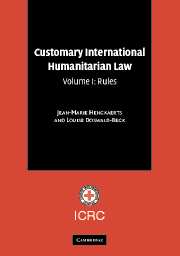Book contents
- Frontmatter
- Contents
- Foreword by ICRC President Jakob Kellenberger
- Foreword by Judge Abdul G. Koroma
- Foreword by Yves Sandoz
- Acknowledgements
- Introduction
- List of abbreviations
- Part I The Principle of Distinction
- Part II Specifically Protected Persons and Objects
- Part III Specific Methods of Warfare
- Part IV Weapons
- Chapter 20 General Principles on the Use of Weapons (Rules 70–71)
- Chapter 21 Poison (Rule 72)
- Chapter 22 Nuclear Weapons
- Chapter 23 Biological Weapons (Rule 73)
- Chapter 24 Chemical Weapons (Rules 74–76)
- Chapter 25 Expanding Bullets (Rule 77)
- Chapter 26 Exploding Bullets (Rule 78)
- Chapter 27 Weapons Primarily Injuring by Non-detectable Fragments (Rule 79)
- Chapter 28 Booby-traps (Rule 80)
- Chapter 29 Landmines (Rules 81–83)
- Chapter 30 Incendiary Weapons (Rules 84–85)
- Chapter 31 Blinding Laser Weapons (Rule 86)
- Part V Treatment of Civilians and Persons Hors De Combat
- Part VI Implementation
Chapter 21 - Poison (Rule 72)
Published online by Cambridge University Press: 05 June 2012
- Frontmatter
- Contents
- Foreword by ICRC President Jakob Kellenberger
- Foreword by Judge Abdul G. Koroma
- Foreword by Yves Sandoz
- Acknowledgements
- Introduction
- List of abbreviations
- Part I The Principle of Distinction
- Part II Specifically Protected Persons and Objects
- Part III Specific Methods of Warfare
- Part IV Weapons
- Chapter 20 General Principles on the Use of Weapons (Rules 70–71)
- Chapter 21 Poison (Rule 72)
- Chapter 22 Nuclear Weapons
- Chapter 23 Biological Weapons (Rule 73)
- Chapter 24 Chemical Weapons (Rules 74–76)
- Chapter 25 Expanding Bullets (Rule 77)
- Chapter 26 Exploding Bullets (Rule 78)
- Chapter 27 Weapons Primarily Injuring by Non-detectable Fragments (Rule 79)
- Chapter 28 Booby-traps (Rule 80)
- Chapter 29 Landmines (Rules 81–83)
- Chapter 30 Incendiary Weapons (Rules 84–85)
- Chapter 31 Blinding Laser Weapons (Rule 86)
- Part V Treatment of Civilians and Persons Hors De Combat
- Part VI Implementation
Summary
Rule 72. The use of poison or poisoned weapons is prohibited.
Practice
Volume II, Chapter 21.
Summary
State practice establishes this rule as a norm of customary international law applicable in both international and non-international armed conflicts. This prohibition exists independently of the prohibition of chemical weapons (see Rule 74). Although the Geneva Gas Protocol was inspired by the existing prohibition of the use of poison, there is sufficient separate practice establishing a specific rule on poison and poisoned weapons.
International armed conflicts
The prohibition of poison or poisoned weapons is a long-standing rule of customary international law already recognised in the Lieber Code and the Hague Regulations. “Employing poison or poisoned weapons” constitutes a war crime in international armed conflicts under the Statute of the International Criminal Court.
The prohibition of poison or poisoned weapons is set forth in numerous military manuals. The use of poison or poisoned weapons is an offence under the legislation of many States. This prohibition is also supported by official statements and reported practice. There is national case-law to the effect that the rule is part of customary international law.
In their submissions to the International Court of Justice in the Nuclear Weapons case, several States recalled the prohibition of poison and poisoned weapons. In its advisory opinion, the Court reaffirmed the customary character of the prohibition of the use of poison or poisoned weapons.
- Type
- Chapter
- Information
- Customary International Humanitarian Law , pp. 251 - 254Publisher: Cambridge University PressPrint publication year: 2005
- 1
- Cited by



